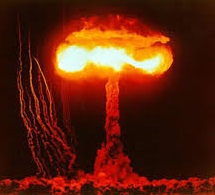
 Fortunately, most of our younger generation has never lived with the threat of nuclear attack. However, this is changing as smaller, more unstable nations are getting their hands on the elements required to build a nuclear bomb. This makes the possibility of a nuclear attack a very real threat. Politics around the globe are at the worst they have been in years and as long as there are countries with nuclear capability, there is a real danger that they may be used.
Fortunately, most of our younger generation has never lived with the threat of nuclear attack. However, this is changing as smaller, more unstable nations are getting their hands on the elements required to build a nuclear bomb. This makes the possibility of a nuclear attack a very real threat. Politics around the globe are at the worst they have been in years and as long as there are countries with nuclear capability, there is a real danger that they may be used.
If a nuclear attack does happen, can we survive it? When looking at Hiroshima, Japan following the nuclear attack during World War II, it is evident that some will survive. How many and what their existence will be like is impossible to predict. Today’s nuclear weapons are much larger and have drastically more destructive powers than the bombs dropped on Japan. This makes it very difficult to estimate what the impact of a nuclear attack today would be. One thing we can say for sure. Those who do survive will be the ones who were prepared for the attack and who live in more rural or remote areas.
Plan Ahead
If we do suffer a nuclear attack, it will not be safe outside for a long time. You will need to stay in a radiation proof shelter for at least 48 hours and possibly longer. Have an emergency survival radio in the shelter to help you track what is happening outside. These radios may be battery operated or can be a wind-up model. Stock the shelter with supplies, both food and medical. Include lots of water since surface water will most likely be contaminated for quite a while. If you have a deep well, consider providing an access point within your shelter.
Food
Stock in plenty of non-perishable foods which can last several years. Select food items with lots of carbohydrates and store them in a dry, cool part of your shelter. The best non-perishable items include white rice, beans, wheat, honey, sugar, pasta, oats, dried fruits and vegetables, and powdered milk. Plan out when and where you buy supplies and pick up a few each time you shop. Your goal is to have a supply that will last you and your family for several months or longer. Ensure you have utensils and a can opener.
Also, bring in plenty of water. You can store water in plastic containers, but clean them with bleach first. Try and store at least enough for one gallon a day per person. If you need to purify water following an attack, also store potassium iodide and bleach.
Stay Connected
It is important that you can stay informed about the situation outside and to be able to alert others to your presence. To do this, you should have an emergency survival radio in your shelter that is either battery operated, solar powered or crank operated. If you choose a battery-operated radio, be sure to have plenty of extra batteries, but is it really better to have at least one radio that does not require batteries. Also, have a weather radio, which can broadcast emergency message 24 hours a day. You should also have several whistles which can be used to signal for help. You should also keep a cell phone or two because even if cellular service is down, you want to be ready when it returns. Also, try and find a solar charger for your cell phones.
Medical Supplies
It is also important to have at least a basic medical kit. This may mean the difference between life and death following an attack. The kit should contain the first aid basics such as bandages, sterile gauze, latex gloves, antibiotic ointment, a thermometer, tweezers, and a blanket. It would also be good to have a first aid booklet which shows you how to administer CPR, apply bandages to wounds, treat burns, and treat shock. If you or anyone in your family takes a daily prescription medication, build up a supply to store in the shelter.
Other Necessary Shelter Items
Stock your shelter with several flashlights and plenty of batteries. If you can find a solar-powered flashlight or other lights, stock them as well. Have a supply of dust masks and plenty of plastic sheeting and duct tape. It is also a good idea to have plenty of heavy-duty plastic garbage bags and wet wipes. Also include a hammer, pliers and a wrench for turning off utilities such as water and gas.
Be Informed
Stay abreast of the news and the world political situation. While a nuclear attack may be launched with no notice, there will most certainly be a political build up to the situation. Most countries have a national warning system that denotes the possibility of an attack.
Preparing beforehand can increase your chances of surviving a nuclear attack. Keep an emergency survival radio handy so you can be aware of what is happening and head to shelter when told to do so.
 Best Survival Advice – Reviews, Tips & Survival Guidance your source of survival tips, preparation advice, and in-depth reviews
Best Survival Advice – Reviews, Tips & Survival Guidance your source of survival tips, preparation advice, and in-depth reviews